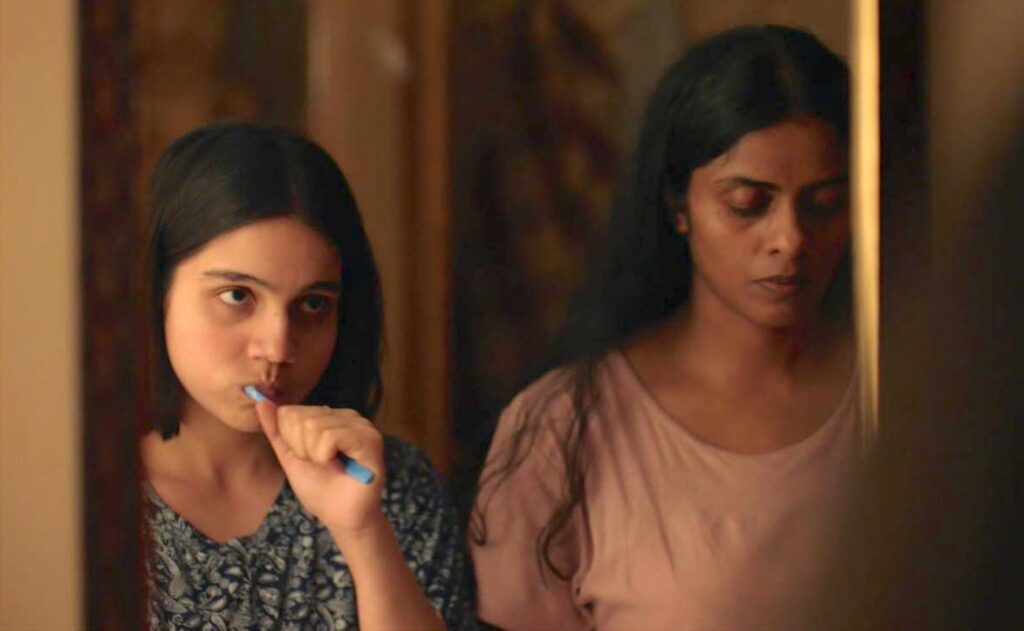In the tempest of puberty, the adolescent soul undergoes a metamorphosis akin to a caterpillar transforming into a butterfly. As this hormonal symphony plays out, the parental figure, once an unwavering beacon of guidance, may suddenly seem like an outdated lighthouse in the stormy sea of adolescence. The generational gap, instead of being a mere product of age, becomes a temporal paradox—a collision of parallel timelines where elders yearn to reclaim lost opportunities, and youth strive to forge their destinies. Shuchi Talati‘s debut feature, Girls Will Be Girls is an impressive and tender coming-of-age drama, skillfully handled with a sure touch. As the writer and director, she exhibits a keen understanding of the maelstrom of emotions that surge when we undergo the blossoming of youthfulness in our first romantic relationship. The film takes us on a delicate journey of self-discovery for a teenage girl as she aligns herself with the symphony of growth, understanding, and shared experiences.
Nestled in a Himalayan hill town in Northern India, Girls Will Be Girls unfolds its narrative with the protagonist Mira (Preeti Panigrahi) breaking barriers in a co-ed school by being appointed as the first female head prefect in the school’s history. We find her wielding authority over the morning assembly’s pledge and policing her peers’ adherence to the dress code, sparing not even her close friends. A diligent student, she divides her time between the dorm and her home in the same town, where her mother, Alina (Kani Kusruti), resides. However, the plot takes an intriguing turn as Mira’s academic world collides with the delicate tendrils of romance. Her heart starts to flutter for Sri (Kesav Binoy Kiron), a fellow student and the son of a diplomat and classical dancer, who was previously studying in a school in Hong Kong. As their connection deepens, it doesn’t escape the notice of Alina, herself an alumna of the same school. Alina, protective and wary, invites Sri into her home, cautioning him against crossing the boundaries of mere friendship with her daughter. In an unexpected twist, Sri’s frequent visits to Mira’s house forge an unexpected bond with Alina. As budding romance takes an unexpected turn, Mira grapples with the fear of losing Sri not to a peer rival, but to the unexpected connection blossoming between him and her mother.

The film is set in an era when internet cafes served as a sanctuary for satisfying sexual desires and curiosity, and young people relied on Walkmans to record personal messages. The school where Mira studies is committed to upholding and embracing age-old Indian culture. It imposes strict rules and regulations, primarily targeting girls, who were expected to be cautious in their interactions with boys and mindful of the length of their school uniforms. In one particular scene, Mira voices her concerns to her teacher about a group of students who were taking pictures of girls as they went upstairs. To her dismay, the teacher’s initial response was to advise Mira to ignore the situation and justify the importance of girls dressing appropriately. This response highlighted the institution’s adherence to an archaic patriarchal and misogynistic mindset. As a result, Mira and Sri’s romantic relationship had to be kept clandestine within the confines of the school. The fear of expulsion loomed over them if the school authorities were to discover their connection. Alina, being a former student of the institution, must have survived the grueling disciplinary measures that were instituted in those times. So, with the progression of Sri and Mira’s relationship, Anila inadvertently finds herself viewing her daughter’s coming-of-age as a symbolic representation of her emancipation – one that was stifled under the tyrannical rule of her overbearing parents. Thus, Talati, with her profound emotions and intellectual curiosity, leads us through a complex vortex of emotions shared between the trio, Mira, Sri and Anila. She skillfully balances the conflicting intentions of the characters within the overarching narrative. She presents us with a tale of intricate human behavior and offers a clear-eyed and fearless exploration of sentiments that delve into the depths of the human psyche, unearthing the complexities of our yearnings, fears, and vulnerabilities.
The delicate world of the film blossoms with exquisite finesse in Jih-E Peng‘s cinematography, where moments as intimate as practicing a kiss on one’s wrist in the bathroom, scrutinizing one’s cleavage in the mirror, or delving into the intricacies of one’s anatomy were meticulously captured. The close-up shots of hands, strategically woven into certain scenes, serve as a portal, inviting us to navigate the sensitive chords of the characters. While the film unfolds against the backdrop of the Himalayan region, the camera abstains from showcasing mere postcard aesthetics. On the contrary, a majority of the frames delve into the interiors, amplifying the encapsulated essence of the story. The film’s auditory landscape is imbued with marked insight and silent resilience, predominantly crafted through diegetic sounds. The quartet of sound designers, Prasenjit Das, Colin Favre-Bulle, Carole Verner, and Laaure Arto, employs a silent approach that amplifies emotions and heightens dramatic tension. In the silent ballet of domesticity, antagonistic glances between mother and daughter pirouette, infuse even the most unassuming scenes with an electric cadence of emotional friction. Amrita David‘s editing finesse weaves a seamless tapestry, preserving the story’s rhythmic flow. Although condensing the film to a concise ninety minutes could have amplified its overall impact.

Talati skillfully infuses her characters with nuance, delivering a quietly captivating and keenly observed performance from the film’s three leads. Preeti Panigrahi’s radiant portrayal breathes life into a character marked by intelligence and susceptibility. Fearlessly delving into the realms of young female sexuality and agency, she radiates both candor and tenderness, showcasing a fragile, unwavering, and memorable essence. Kani Kusruti, in the role of Alina, brings restrained elegance and calmness to her character. Her expressions are intricately nuanced, revealing a spectrum of emotions—whether in moments of calmness, anger, or brittleness—with equal intensity. Kesav Binoy Kiron infuses Sri with an unmatched charm, portraying a young boy whose maturity surpasses his age. He navigates the delicate path of maintaining relationships without causing harm to others’ sentiments. Devika Shahani portrays the strict and disciplinary teacher, Ms. Bansal, with an authoritative presence that feels organic to her character.
By the time we reach the final frame, the narrative, propelled by the theme of the loss of innocence, transforms into a commemorative journey marking the initiation of a strong bond from a daughter to her mother. While the film falls short of delivering a euphoric viewing experience, a more profound exploration of conflicting moments between Mira and Alina could have injected the film with the much-needed impetus. The unsettling scenes toward the end, where the boys pursue Mira to her dormitory, feel somewhat forcibly integrated, seemingly creating a sense of unease. The conspicuous absence of Mira’s father throughout much of the film remains unexplained. Nevertheless, Girls Will Be Girls stands as an assured debut, solidifying Talati as another unwavering voice to watch out for.
Girls Will Be Girls won the World Cinema Dramatic Special Jury Award for Acting and the Audience Award at the 2024 Sundance Film Festival.






